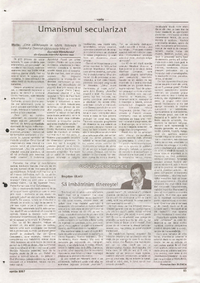160
tulemust jaotises
Teema
 Sekulariseerumine
Sekulariseerumine
Sekulariseerumine
Society moving towards secular values
The author of this article discusses the ways in which gender equality and intersectionality are understood and enacted in two recent feminist campaigns in Sweden that use similar techniques to mobilise support for different causes. The first campaign is …
'Die Anschläge am 11. September 2001 in den USA, die Anschläge in Madrid am 11. März 2004 und London am 7. Juli 2005, der Mord an Theo van Gogh am 2. November 2004, aber auch Anschläge auf Moscheen, z.B. in Linz, Wolfenbüttel oder Usingen, haben das T…
The question of the correlation between Islam, political Islam and liberal democracy has so far been the most exposed topic in exploring the democratic capacity of political Islam and Islamic societies in general. What is particularly intriguing about the…
This article presents results of the author’s PhD thesis based on religious beliefs and practices, and attitudes of towards marriage, life, and sexuality. The sample included 500 undergraduate students from public universities of Lisbon. Applying multiple…
The idea of an “Islamic civilization” emerged in the very late period of the Ottoman Empire in the context of complex and multi-dimensional modernization and secularization processes. Enunciated by the Young Ottomans in the 1870s and gaining prominence in…
The impact of the two main religions on demographic behaviour until the middle of the 20th century is striking and, depending on religious affiliation, remarkable differences can be observed with regard to celibacy, fertility and size of family. In Cathol…
The Czech Republic is often said to be one of the most secular countries in Europe, or even in the world. For this, in accord with the secularization thesis, the modernization is often mentioned, where it was supposed that it automatically leads to the de…
"Why is it that the Arab spring came as a surprise to the majority of western observers? To answer this question, it seems necessary to first of all understand the general perspective of the West, the Mubarak regime, as well as Al-Qaida on the Middle…
Der Autor begründet in seinem Beitrag die These, dass die heutigen Unternehmen bzw. die Unternehmenswerbung zunehmend Funktionen übernehmen, die bislang vor allem von der Kirche erfüllt wurden. So versuchen die Unternehmen in den letzten Jahren nicht nur …
Der vorliegende Beitrag setzt sich kritisch mit dem Buch "Die Unsichtbare Religion" von Thomas Luckmanns aus dem Jahr 1963 auseinander. Zunächst werden die zentralen Aussagen vorgestellt und auf ihre wichtigsten Kritiken eingegangen. Im nächsten…
The Church-State relationships in EU Member States are in a process of a radical transformation. This is the result of a rapid political integration and also of the major transformations of the modernity. Religion is still part of the European public spac…
Established institutions and policies of dealing with religious diversity in liberal democratic states are increasingly under pressure. Practical politics and political theory is caught in a trap between a fully secularized state (strict separation of sta…
When one considers the results of social scientific surveys, secularisation in Germany seems to be a more or less linear process of erosion of what is traditionally named religiosity. The percentage of citizens who affirm that they are "religious&quo…
This review-study aims to present a critical exposition of the ground-breaking work in the study of secularisation, Charles Taylor's Secular Age. The study points to the links with Taylor's preceding work, Sources of the Self, which consist above …
2nd ed.; Munich, Bavarian State Library -- 2009.54155
'A recently conducted survey of the Institute of Sociology at the University of Vienna identified and examined six types of religious-ecclesiastic orientations in Austria. This article focuses on two main issues: first, the widely discussed topics of …
"The territory of the former GDR is one of the most secularized regions in Europe. The well-known church sociologist E. Neubert speaks drastically of a 'religious super-GAU’. A widespread thesis is that large-scale dechurchization and religious d…
Die Religionen dieser Welt erscheinen eine Wiederbelebung zu erfahren. Nicht nur das wissenschaftliche Interesse an ihnen wächst an, sondern bis in die politische Öffentlichkeit hinein erleben sie Zustimmung und Aufwertung. Für den kritischen Beobachter h…
The parliamentary elections of October 26 show that many voters reject an Islamist state model for Tunisia. It also illustrates how fragmented and disputed the proponents of a secular model are, although their cooperation would be more necessary than ever…
